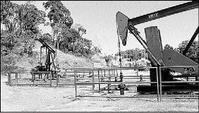Linda Hutchinson-Jafar, Business Writer

Oil refinery equipment as seen on the Petrotrin website.
Trinidad and Tobago is considering an overhaul of the tax and incentives schemes for its energy sector, hoping to fashion a regime that will drive investment in exploration and production, which analysts say have lagged in recent years.
The review was announced by energy minister Conrad Enill in a speech in Port-of-Spain in which he reiterated a swath of sector initiatives - including plans for a new oil refinery and the auctioning of off-shore exploration blocks - that have long been on the agenda.
The refinery is a US$3-4 billion project that was first announced in 2005.
Wednesday Business understands, however, that its construction is unlikely before the next two years.
Petrotrin is in the process of clearing the project site in preparation for the development, but the process involving relocations and demolitions won't be completed until December 2009.
Analysts have been warning of the need for new investment in energy, particularly in up-stream projects, if Trinidad is to continue to generate the income to deliver the double-digit growth and heavy investment in social and physical infrastructure of recent years.
Twin obstacle
But the government has faced a twin obstacle in encouraging firms to fork out the requisite cash: a decline in reserves, and the argument by energy executives that they needed better incentives.
Enill, a former junior finance minister, underlined these concerns which he said the Patrick Manning administration hoped to address with the review of the taxation and incentive policies, on which independent consultants and government officials have already begun to work.
Among the issues been looked at are:
The fiscal incentives for deep water exploration;
The supplemental petroleum taxes to small petroleum operators;
Incentives for marginal or small fields, drilling activities, enhanced oil recovery and heavy oil;
The structure of production-sharing contracts; and
The taxation and fiscal regimes for downstream projects.
"The aim of this exercise is to ensure that the taxation legislation continues to be relevant to the changing energy sector needs and contributes in a positive manner to its sustained growth and development," said Enill, a former junior finance minister.
Trinidad and Tobago produces about 150,000 barrels of oil a day, but the strength of its energy sector is gas, which has powered its development into the industrial powerhouse of Caricom.
Keen to find reserves
However, the country is keen to find new reserves in the face of an audit 14 months ago which showed its proved, possible and probable or 3P reserves at an estimated 30 trillion cubic feet, a nine per cent drop from two years earlier.
Those findings spurred the government into action — with some success, explained Enill.
"You will recall following the release of the results of the last audit, concerns were raised in some quarters about the adequacy of our gas reserves," he said.
"At that time, we pointed out that the results was an indication that government should review its policy on the fiscal regime."
On target
Added Enill: "We have acted and to date we are on target. The recent discovery in the North Coast Marine Area and the East Coast Marine Area in the current exploration programme

